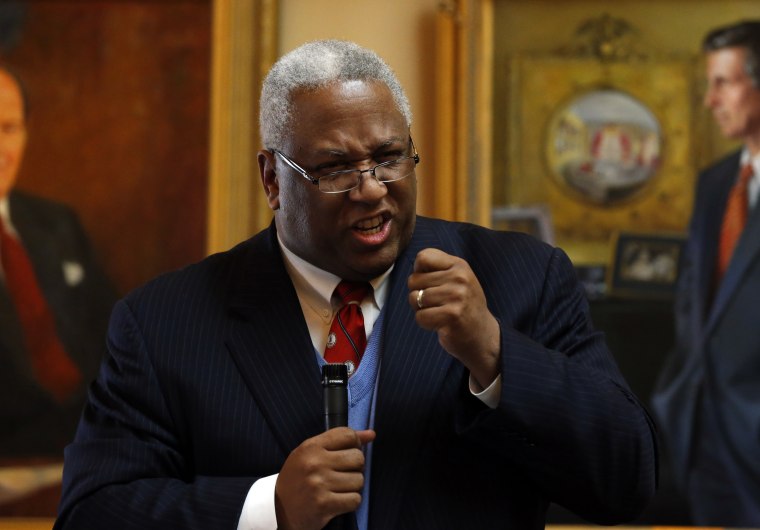The electoral college is maligned by some as an outdated mode of doing our democratic business—one that has on three occasions, allowed the loser of the popular vote to assume the highest office in the land.
Those currently targeting the electoral college aren't seeking to replace it so much as rig it—and they're doing so through state governments, out of the reach of Washington.
Virginia, on Wednesday, became the latest state to not only weigh a measure in its legislature that would end the winner-take-all nature of the electoral college. In fact, they're pretty much speeding towards that outcome:
Virginia's Republican-ruled legislature has taken the first steps toward ending the state's winner-takes-all system of apportioning its 13 presidential electoral votes. A Senate subcommittee recommended Sen. Bill Carrico's bill on Wednesday on a 3-3 party line vote...The candidate winning the majority of districts would receive the two electoral votes not tied to [the 11] congressional districts.
State Senator Charles "Bill" Carrico's bill, Senate Bill 723, would allocate Virginia’s electoral votes by congressional district. What does that mean? As Rachel Maddow explained Wednesday night on her show, that means that despite President Obama winning more than 140,000 votes in Virginia than his challenger, Mitt Romney, he would have garnered only four of the state's 13 electoral votes.
Paraphrasing Mays Gilliam, that doesn't seem to be right.
Wade Henderson of the Leadership Council on Civil and Human Rights was heated about this topic on Sunday's Melissa Harris-Perry, before Virginia pushed their plan forward. It's because it's hardly unprecedented—Pennsylvania tried and failed to do it all the way back in 2011. And it seems like forever ago that Ohio Secretary of State Jon Husted hinted at, then sheepishly withdrew his electoral-votes-by-district plan shortly after the election. Now, this notion that the electoral college can and should be altered has the endorsement of Republican National Committee chairman Reince Priebus, whose native Wisconsin is also considering the idea.
It's no coincidence: The states considering eliminating the winner-take-all model are all controlled by Republicans—from the governorship to the state legislature—yet all went for Obama in November, these included Ohio, Pennsylvania, Wisconsin, Michigan, Florida, and Virginia.
Henderson broke it down on MHP:
"They're so bold. It's an example of, 'if you don't like the result, then change the rules.' Now here's a president who won 51% of the popular vote; Romney won 47%. That settles the question of how the electoral college votes are decided. But since they didn't win, they've now come back with this diabolical scheme to allocate electoral votes in a proportionate way. If, in fact, the election were held under the rules now proposed... President Obama would not have won.So, this is clearly an example for building a case for changing the rules in a way that would alter the outcome of the election..."
Getting rid of the electoral college and electing by national popular vote seems to be the end-game, Harris-Perry said; Barbara Arnwine, the executive director of Lawyers' Committee for Civil Rights Under Law, agreed. In a pure sense, the idea of allocating electoral votes by congressional districts isn't necessarily the worst idea in the world, nor is it inherently advantageous to the lawmakers passing such a plan.
The redistricting, or "gerrymandering," has to be done first in order to make this worth it.
Two days prior to the Virginia Senate advancing the new electoral-vote strategy, they pushed through a newly gerrymandered district map in the absence of Henry Marsh, a 79-year-old civil rights veteran and Democratic state senator who'd left for Washington to participate in the inauguration. Although Virginia governor Bob McDonnell has criticized the move, he has failed to commit to veto the map.
But the real gerrymandering in these states occurred after Republicans experienced great electoral success in 2010, which led to the consolidation of party power bases in swing states. This set the stage for 2012, when Democrats running for the House received more than one million votes than Republicans, and still barely made a dent in the GOP House majority. (This is something that Republicans are quite proud of, by the way.)
And the worst part? Dave Weigel noted Wednesday in Slatethat if Virginia's proposed elimination of winner-take-all electoral votes would make it "like taking New Hampshire or Rhode Island," both of which had only four electoral votes in the 2012 presidential election. "That's because this reform is designed to disenfranchise Democrats, not make the state more important."
Update, 1/25: If I may add one more thought pivoting off the Weigel item at the end, inspired by what @norbizness tweeted at me this morning: all of this sounds a lot less like making honest concerns about improving voter representation; in fact, just the opposite. It sounds like a 21st-century Three-Fifths Compromise, directed at anyone who dares to not vote Republican.
This isn't small-d democratic, in any sense.
